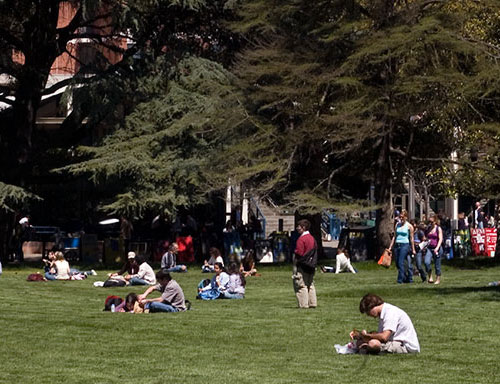 Expressing Disagreement Before, After or During an Event
Expressing Disagreement Before, After or During an Event
- Write guest editorials or send letters to campus newspapers, Associated Students/campus resources, political representatives, groups, individuals, administrators or responsible parties.
- Lend support, reassurance and empathy to others who may be hurt by offensive messages.
- Be sure to comply with all University of California policies, UC Davis policies, and local, state and federal regulations.
Expressing Disagreement During an Event
Inside the room or event.
- You may engage in peaceful, non-disruptive protest (for example, messages on shirts, turning your back to a speaker, putting tape over your mouth) if it does not create a disturbance or prevent the speaker from communicating to the audience, or otherwise prevent audience members from hearing and seeing the event.
- Audience members may choose to leave the event as long as they do not obstruct the presentation.
- If you disrupt or obstruct the presentation and fail to comply with the directions of university officials to cease disruption or leave the area, you will violate the university's code of conduct and/or the law. These are grounds for discipline or prosecution.
- For events held where access to the event space can be controlled/secured, event sponsors may regulate what may be brought into an event space (such as video cameras or other recording devices) and activities that attendees may engage in; regulations such as these are permitted as they relate to time/place/manner (i.e., conduct) and not content.
Outside the building, room or event.
- Peaceful protest or picketing with leaflets, petitions, singing, chanting or signs is allowed as long as it occurs in a space that is open to the public and does not disturb the event or prevent attendees from entering or leaving the event.
- Do not block entrances or exits, impede pedestrian or vehicle traffic, or prevent others from entering, hearing, seeing or leaving the event or speech.
- Do not use amplified sound unless allowed by applicable university sound policies.
- Do not disrupt university functions or activities (such as nearby classes) or other events or programs using reserved space.
Expressing Disagreement in Response to an Event
Before, after or during the event, you can respond to speech that you disagree with by sponsoring a separate presentation or event featuring alternative viewpoints, such as a:
- Teach-in
- Public forum
- Vigil
- Counter-demonstration
- Exhibit
If you are confronted with offensive speech or materials:
- Maintain a safe distance, and do not respond physically.
- Keep in mind that even though you find it offensive, it is very likely protected free speech.
- Consider organizing an appropriate, nonviolent response.
- Seek assistance from a university official if you feel you are being singled out or targeted or if you think that the conduct or speech violates university policy.
Scenarios
 A Speaker in a Public Area on Campus
A Speaker in a Public Area on Campus
Imagine there is a speaker on campus saying things that you deem hateful.
Is this behavior protected by the First Amendment?
Yes, it is.
Why are they allowed to be here?
The First Amendment protects nearly all speech, including speech that is annoying, rude, offensive and potentially hateful to you. On a public university campus, plazas and sidewalks are public forums where free speech can occur.
What can you do?
There are many different options you can choose. Very often, the speaker is deliberately provocative in an attempt to gain an audience. One option is to ignore them completely and deny them that audience. You also have the right to rebuttal. You can engage in counter speech as an extension of your First Amendment rights. Additionally, if you believe you have experienced or witnessed an act of hate, bias, discrimination or harassment, report it so the university can follow up appropriately.
What can you not do?
It is very important to note that you cannot touch any speaker, no matter how offensive you view their speech. By doing so, you might bring consequences upon yourself, while also obscuring the validity of your point of view.
 A Speaker in a Classroom
A Speaker in a Classroom
Suppose that one of your professors is bringing in a guest speaker/lecturer that you believe is inappropriate or offensive.
Is this protected by the First Amendment?
Yes.
Why are they allowed to be here?
It is important to note that the principles of academic freedom protect freedom of inquiry and research, freedom of teaching and freedom of expression and publication. Academic freedom offers broad discretion to educators regarding free inquiry and the exchange of ideas and opinions expressed in a university setting, and it grants universities the right to determine their educational mission without restraint. All that being said, there are still things you can do.
What can you do?
You can protest the speaker outside of the building in public areas. If you plan to use amplified sound during your protest, you"ll first need to obtain a permit from Conference and Event Services. You can also use social media to protest and raise awareness about the speaker and your objections or points of rebuttal.
What can you not do?
You cannot disrupt the class or speaker. This may violate and subject you to student disciplinary action under the university's standards of conduct for students.
A Speaker Invited to Speak on Campus
Imagine there is a speaker known to say things you deem hateful who has been invited to speak on campus by a member of faculty, staff, registered student organization or other recognized group.
Is this speech protected by the First Amendment?
Yes, it is.
Why are they allowed to be here?
The First Amendment protects nearly all speech, including speech that is annoying, rude, offensive and potentially hateful to you. By allowing students access to use university facilities, such as auditoriums, classrooms and other buildings, to host speakers, the university has opened up such forums as public forums. Therefore, the university will not, and legally may not, discriminate based on content or viewpoint.
What can you do?
As mentioned in the previous scenario, there are many different options you can choose. Very often, the speaker is deliberately provocative in an attempt to gain an audience. One option is to ignore them completely and deny them that audience. You also have the right to express your disagreement during the event, outside the venue or on social media in accordance with the guidance and limitations listed above.
Additionally, if you believe you have experienced or witnessed an act of hate, bias, discrimination or harassment, report it so the university can follow up appropriately.
What can you not do?
You may not disrupt or obstruct the presentation. You may not block attendees from entering into or exiting from the event. It is very important to note that you cannot touch any speaker, no matter how offensive you view their speech. If you do, you may be subject to student disciplinary action or arrest.
Disagreement with University Administration
Imagine you would like to protest action by university administration by physically and actively expressing your disagreement.
What can you do?
You have a range of options. You may circulate a petition or send a letter voicing your concerns to the administration. You may request to meet with university officials to discuss your concerns. You may engage in peaceful protest or picket with leaflets, singing, chanting or carrying signs in a space open to the public, such as the area outside the building or within lobbies during business hours.
What can you not do?
You may not engage in an occupation/sit-in of an office or other non-public space in a university building in violation of the university's time, place and manner regulations. If you do, you may be subject to student disciplinary action or arrest for trespassing.
You may not block traffic into or out of the room, floor or building. You may not obstruct or disrupt university staff or officials while they are fulfilling their duties. If you do, you may be subject to student disciplinary action for obstruction or disruption of teaching, research, administration or other university activities.
You may not engage in tagging or mark university facilities with graffiti. If you do, you may be subject to student disciplinary action for destruction or damage to university property or arrest for vandalism/graffiti.
Civil Disobedience
Protests and civil disobedience have played a historic role on university campuses, in bringing important and beneficial changes within society and in the development of our democracy. However, civil disobedience is not protected speech under the Constitution. The Constitution does not guarantee any right to engage in civil disobedience—which, by its very definition, involves the violation of laws or regulations—without incurring consequences. Civil disobedience may have a negative effect on the protected interests of others and may interfere with university business or threaten public safety or university assets in ways that require the university to act to protect those other interests.
What can the university bring disciplinary charges against me for?
The following is an illustrative list of violations of university policy:
- Destruction of or damage to university property (PACAOS 102.04)
- Abuse of university electronic resources and systems (PACAOS 102.05)
- Physical abuse or threats (PACAOS 102.08)
- Obstructing or disrupting university activities (PACAOS 102.13; PPM 390)
- Disorderly or lewd conduct (PACAOS 102.14)
- Unlawful assembly (PACAOS 102.15)
- Failure to provide identification to or comply with directions of university official (PACAOS 102.16; PPM 390)
- Failure to comply with exclusion from or order to leave university property (PPM 390)
What can the police charge me with?
The following is an illustrative list of violations of state and federal law:
- Resisting arrest or delaying a peace officer (Penal Code § 148)
- Assault and battery (Penal Code §§ 240-248)
- Disrupting a public meeting (Penal Code § 403)
- Attempting to free a person who has just been arrested (Penal Code § 405a)
- Riot and unlawful assembly (Penal Code § 404-408)
- Failure to disperse (Penal Code §§ 409)
- Disturbing the peace (Penal Code § 415)
- Vandalism/graffiti (Penal Code § 594)
- Trespassing (Penal Code § 602)
- Refusing to obey a peace officer who is enforcing the Vehicle Code (Vehicle Code § 2800(a))
- Using force, a threat of force or physical obstruction to interfere with a person's right to reproductive health services or to attend a place of religious worship (18.U.S.C. § 248)
Report Violations and Concerns
If you believe your rights have been violated or that you have witnessed an act of hate, bias, discrimination or harassment, learn how and where to report it.
Planning an Event or Protest
Whether using amplified sound, bringing in a speaker or displaying symbolic structures, there are many things to consider when planning a protest or event at UC Davis.
Expressing disagreement content was adapted from the University of California, San Diego, with permission.
Civil disobedience content was adopted from the ACLU of Northern California and is available at https://www.aclunc.org/sites/default/files/know_your_rights_free_speech.pdf.